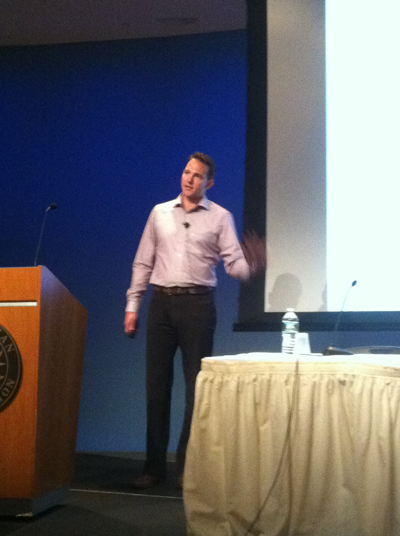Apps not going to be large source of revenue during holidays: Ogilvy exec
NEW YORK ? When it comes to mobile holiday marketing, brands should focus on in-store drivers due to the emotional factor involved with buying gifts for loved ones, according to a speaker at the Mobile Marketing Summit 2011.
Brands can drive people in-store through mobile campaigns using geolocation-based text messages and optimizing mobile search. Surprisingly, applications and mobile commerce sites are not expected to be largely successful in this year?s holiday sales, according to an agency executive.
?Christmas shopping is special because 70 percent are gifts,? said Martin Lange, New York-based executive marketing director of digital strategy at OgilvyOne Worldwide.
?The mindset is different between regular purchases and gifts, in that gifts are personal and emotional and meaningful,? he said.
?When you walk by Saks Fifth Avenue or by a Christmas tree, you realize that the atmosphere is a very important thing around Christmas because it is such an emotional time.?
Search and location
Despite the success of mobile deals and discounts for retail brands, mobile coupons are not going to drive consumers into luxury stores.
?If you look at studies of where people are making the purchases, 93 percent are still being made in the physical retailer,? Mr. Lange said.
Luxury brands will need to use more subtle, location-based text messages such as private events, or early shopping hours to woo affluent consumers.
In addition, brands need to optimize their mobile search engine listing so they appear above department stores that sell luxury brands.
To do this, marketers need to learn what their customers search for on mobile devices such as store location, ratings and reviews or prices and make sure that their brand pops up first.
Mobile search is particularly big among affluent consumers, who are often older and may not be as mobile-savvy as younger consumers. Search engines such as Google look the same and ask the same thing from consumers.
?Christmas shopping marketing won?t be about mobile commerce but about understanding how mobile phones are being used in any single shopping process,? Mr. Lange said.
Once consumers are in-store, luxury brands can use mobile technology to help inform the likely temporary holiday salespeople about each and every product.

Window shopping
Brands also need to realize that apps are not going to be a large source of revenue during the holiday shopping because a majority of consumers still do not trust retail brands enough to enter their credit card information into a mobile device.
A Google study found that smartphone owners use less than half of the apps on their phone during a monthly basis, according to Mr. Lange.
?So if you want to use a mobile app, you have to make sure it is engaging, important and critical,? Mr. Lange said. ?So we tell marketers, 'Why don?t you look at apps that are already out there and make partnerships.'?
Particularly for holiday shopping, marketers should get their brands into holiday wish lists and shopping guide apps.
These apps are where marketers will find the most aggregated mass of shoppers without having to take the time or money to develop a specific branded app.
Luxury brands, specifically, need to find a way to translate the in-store holiday shopping experience into the mobile realm to intrigue people.
?For luxury, it?s more about capturing the experience of Christmas shopping,? Mr. Lange said.
?For example, on Fifth Avenue [in New York], the investment stores make into the shopping windows -- they are museums in themselves,? he said.
?So, I would see how to project that experience and translate it into a mobile service to provide an experiential entry.?
